Chris Merrick Hughes talks to SDE about his new album, Eirenic Life
Legendary producer Chris Merrick Hughes made his name working with big name acts such as Adam and the Ants (he produced Kings Of The Wild Frontier, as well as being the drummer!) and Tears For Fears (worked on all three albums issued in the ’80s). In 1994 he issued an electronic/experimental album called Shift and today sees the release of a belated follow-up called Eirenic Life. SDE caught up with Chris a few weeks ago to discuss the new album…
SuperDeluxeEdition: For those who haven’t heard the new album or maybe have just heard a few little snippets, what can they expect?
Chris Hughes: Well I suppose those that might know of me at all, may know ‘Shift’ and they may know obviously when I was in The Ants, and obviously connected with Tears for Fears, but this record, I don’t know if they expect anything really, you know? The best thing I can say is that, as you will know from having listened to it, it’s essentially a piano record with some electronics and other bits and pieces. That’s the most simplified description of it really.
SDE: And did you have any kind of game plan, or was this just a sort of purely organic thing which grew from your experimentation?
CH: Yes. It came from experimenting. What I tend to do, I sort of experiment and record a lot of stuff, and always put it on the shelf, never in the bin. And I kept coming back to various ideas which were ideas of process. A lot of the construction for this record was done by me building various music generators and sequencers, I did those on the computer, obviously. They were done with things like Macs, SuperCollider. There is a list, I haven’t got the list to hand, but there is a lot of software that I wanted to sort of bespoke it so most of it is my own generators and sequencers. And I just recorded and then started playing piano with the pieces and built them up and put them on the shelf. And there came a point where I had quite a lot of stuff and just started sort of selecting bits and collating and curating, and then it sort of took on the form of a record.
SDE: Was that a piano recorded acoustically? How did you record it?
CH: It’s a massive combination of bits of playing which were recorded using midi and then manipulated. It’s a couple of pianos that I sampled which we used in a midi or in a sort of generated sense, and then there’s bits of me playing both… well soft and hard pianos, real piano, there’s bits of playing and [they’re] edited, obviously, and bits in an acoustic setting, and then there’s stuff which is like more standard pianos. So it’s a massive combination of all of those things really. And there’s bits where the computer is playing bits and I’m playing along, and then have used a blend of me playing and the computer, so it’s just about kind of all versions really.
SDE: What are the challenges then, with these kind of ambient, experimental kind of compositions where you don’t have the usual roadmap of verse, chorus, middle eight and all that? Is that a challenge, or is it a freedom?
CH: Well it’s a very good question – it’s actually both. Because when I thought it was going to be an album, I was very proud of the fact, and it didn’t turn out like this, but I was at the time very proud of the fact that there wasn’t any specific rhythm or pulse, that they were quite sort of arrhythmic, [although] it didn’t turn out that way. But I was enjoying listening to pieces I had done where it wasn’t sort of like a thumping pulse, it was kind of much more fluid and floating, I really enjoyed that. It didn’t last, because I did actually use rhythm and it’s what you might call gridded rhythm or close to gridded. Certainly in the case of the opening piece, up until the second half which is NSV, the opening part of the prelude piece, there’s no [appreciable] tempo. And certainly Girl with the Jesus Towel, most of that doesn’t have a specific tempo.
The pieces are very, very simple. There’s not a massive amount of harmonic development, it’s all very very primitive, and that was quite deliberate. And that was a challenge because there’s a tendency to sort of put things in a sort of chordal sense and have chord progression and all the kind of standard things which a lot of easy listening or sort of easy-ambient records have, you know? And I was trying to avoid that. I didn’t want it to be… I know the word ambient is thrown around, at the minute, it sounds like it’s a bit dull, they use the word ambient, but it wasn’t supposed to be an ambient record, it’s supposed to be a suite of pieces which were kind of moody and a little bit challenging on some level, but not really ambient. So there’s quite a lot of composition, and it’s all very primitive melody, it’s all single line melody really.
I tell you what, have we ever discussed Tubular Bells?
SDE: No…
CH: When it came out in 1973, as a kid I was working at Virgin Records at their sort of flagship place in Notting Hill, and I can remember on a Saturday morning, people in the shop would put Tubular Bells on, and honestly without any promotion or any kind of story, people would come into the shop and say ‘Wow what’s this? Wow, I’ll buy this’. And I can’t think of another record where, without anyone enthusing or playing it to a mate, people would just be standing in the shop and go ‘Oh I need a copy of this’. And it’s an extraordinary case of something that was effectively just [two sides]. I think that was a very, very early record for me where clearly something was shifting away from the three minute single to something that was kind of moody and more journeying, and I’ve always loved that. I was a huge fan of Rainbow in Curved Air by Terry Riley, that is still to this day a major influence on me.
SDE: Your album title means ‘aiming towards peace’, I believe?
CH: Yes it does. Eirenic … actually not that I was really bothered or that aware of it at the time, but there was actually religious connotations, which I to this day don’t understand how that crept in. But as far as I was aware, Eirenic was just something which was like about serenity, tranquillity, looking at a peaceful version of something. I think actually people that are highbrow about that word say it’s conciliatory, it’s about trying to forge peace in a situation which is a little tricky. I don’t go for that myself, well that wasn’t my intention. It just struck me as a word which was like serene and taking a peace … not peaceful in the sense of sitting under a tree doing nothing, but peaceful in the sense of not being angered or at war. The idea was it was supposed to be a kind of fairly peaceful calm, calming record. So to have an Eirenic Life is something to strive for really I suppose.
SDE: Is that a reaction to the kind of ‘noise’ of the modern world?
CH: Well it’s a reaction to things which are expressed in the aggressive, yes…which I’m a big fan of as well. I’ve got tons of records, and films and all sorts of stuff which is quite agitated and angry – for the right set of reasons – and it’s part of the human condition and I’m happily into that as well. But the record I wanted to make was one of just… ‘oh actually just fucking calm down’, you know? So that’s where the title came from. And then there are certain things in there that I was agitated and fucked off about. NSV which is coded, it’s really that … it’s a sort of non specific violence, non secular violence. It’s kind of … it’s almost about how fucked up the church is in terms of their covering up all their kind of child abuse and sexual aggression… It purports to be a very peaceful, but actually it’s not; in the main it can be pretty hideous. So NSV has got a slight undertone about something that is not very peaceful and a little bit horrible, but the bit of writing, I decided was to make that quite hypnotic and tranquil is a kind of antidote really. So honestly Paul, it sounds highbrow and up my own arse, but it really isn’t, for me it’s pretty straightforward, pretty simple.
SDE: You talked about Tubular Bells and people walking into shops and buying it. Obviously that isn’t going to happen with this album because we’re in a whole different place with how people consume music, how people buy music and all the rest of it. When we spoke a while back, there was a suggestion that what became Eirenic Life was maybe just going to be a little personal thing that you would distribute to family and friends. So did it become important – once you had completed this – for you to actually get it out there in the marketplace one way or another and “release a record”?
CH: Well the thing is, I’ve held true to the notion of what I originally wanted to do and so I pressed up a bunch of records with the CD in it and I’ve basically been giving those to friends, I’ve given away a lot to friends. And yes most of the list of people I wanted to send it to is complete now. And so that was kind of phase one. And then we had discussions with various people, the idea was that yes okay we will do a kind of a release of this vinyl, why not, let’s just release it? And there has been no big commercial push. Well for a start there’s no point. This record has got an intimacy and it’s quite small in its ambition, you know? But it has turned out in a way that…seemingly people like the endeavour, so I’m happy to release it. But I’m not expecting big sales.
SDE: So, you’re not going to go to HMV in Oxford Street to do signing sessions?
CH: No I probably won’t! But I think I’m doing a signing session in a mate of mine’s record shop in Bristol at some point.
SDE: Is there any reason you didn’t issue just a standalone CD on its own, because you mentioned you get the CD with the record, but if you don’t like vinyl then you can’t really buy just the CD, can you?
CH: Well I think phase one was as I say to just make the vinyl, put a CD in it in case my mates couldn’t be faffed, and give it away to mates. That’s phase one. It will be released as a CD at some point. Yes, it would be nice to make a nice little miniature CD of it all. I might even do a CD version which is a bit different. It might be worth swapping out something and putting another piece in. I’m working on a sort of … well I’ve got two follow ups. One is a sort of ‘wobble’ [laughs], I don’t know how to describe it, it’s like wobble electronics, wobbling synths and some electronic sort of vocal sounds… so I’m about a third of the way through that. And I’ve also compiled an EP which is for one new piece and three other pieces that were left off Eirenic Life which hopefully I might even just put it up for free in November or Christmas time, do a kind of Christmas gift type EP which goes under the title of Armistice at the moment.
SDE: Is this a new found enthusiasm to record and create your own music?
CH: I’ve been recording and putting stuff on the shelf and forgetting about it and then revisiting things. There was a sense that all the pieces for Eirenic Life might as well be made into something. I’ve enjoyed the process so much that I’ve found myself forcing myself to do more, well forcing myself to actually pull stuff back off the shelf and go yes okay ‘finish this and collate this and this, and then maybe release it. So yes definitely I’m inspired to do … and quite honestly Paul, I’ve done … across time, I’ve done quite a lot of production work, and I still love it, and I’m indeed doing an album with a band as well at the moment.
SDE: You’re not tempted to just retire from producing and have an easy life, pottering around?
CH: I don’t think I can at the moment, no. I have to do less hours, because as a kid I had a ‘studio tan’, I was in the studio the whole time, and loving the life, and loving the lifestyle and all that, but there’s more, there’s other things. And so I’ve kind of … and actually to be honest I can get my best work done in six or seven hours instead of 13. Also, in a way, producing is a young man’s game. There are so many great younger guys, and women, that are making great records, and they’re really contemporary and they’re really fascinating and interesting. And I suppose I would be happy to do an album if there was a band that perhaps were a bit more established and knew the process of recording and I wasn’t taking them through the stages of ‘this is a microphone’. And maybe working on sort of more of a consultant level, I would be happy to do that.
SDE: But do you miss the kind of satisfaction of working on an Ants record or Tears for Fears, or whatever, and then seeing it do well in the charts and just end up in people’s bedrooms or their lounges, you know? As I was saying before, the industry has changed so much. That ‘life of its own’ thing where a record sort of pervades the nation and becomes a big selling record, that doesn’t really exist anymore… unless you’re Adele or a very tiny minority.
CH: No that’s absolutely spot on Paul, that’s completely right. We don’t have a mainstream, as we did, yes. I tell you a sensation that I have enjoyed in the past, and that is when you’ve worked on a track or something and you hear it and you think oh that isn’t balanced right, or there’s that fault in it, and you’re not sure you’ve got it exactly right or whatever, and then it gets released and then you hear it in another context, playing on a radio or something. And all of those anxieties and concerns about what you’ve been doing go! And quite honestly, I do like that. It doesn’t have to be a great success, it’s just quite a nice feeling. I did an album with Robert Plant, and I heard a track called 29 Palms on the radio the other day, and yes I like it a lot, I have to say. And I remember listening to it and thinking ‘fucking hell that’s my drumming’ [Chris co-produced Plant’s album Fate Of Nations]
SDE: The whole concept of a producer being brought in to create ‘a hit’ or make the album a hit, has slightly been sidelined hasn’t it?
CH: Absolutely.
SDE: So, the role of a producer has sort of been redefined, in some kind of a way.
CH: Very much, that’s absolutely right. There are so many cases where records get released where they’ve run out of money and there’s not much kind of impetus. And the A&R guy goes ‘Well why don’t you just polish up the demos?’ you know? And there’s has been records made where there hasn’t been much producer involved in looking at the process of what they’re trying to achieve, it just gets sort of put out.
And also, I’m always fascinated by the discussion that people have about ‘the album is dead’ – it’s all about the individual track – and I’m thinking well it’s certainly both, you know? There’s a lot of people I know that love listening to something that sounds similar, they like listening to one band making a piece of art…
SDE: I was talking to someone about this the other day and I actually think the single is dead, not the album, because what is a single anymore? An album gets promoted and someone will put a track on YouTube and say ‘This is the first “single”’. In the old days record companies would have to invest money, the sleeves would be designed, records would be pressed, there was a lot of stress about what is going to be the single, what isn’t going to be the single, and a lot of time and thought went into it. But now because all the record company have to do is basically say ‘This is the new single’ and a digital file goes to Radio 1 or whatever, then it’s not taken seriously anymore, because if it doesn’t work out it doesn’t matter, we will just try the next one or we’ll try the next one – there’s not very much cost or investment associated with it.
CH: You’re absolutely right, that is absolutely spot on. I can remember being in the middle of an album and A&R saying ‘Oh well we need three singles and what have you got? Could we chop that up and make that a single?’ And you would go into a big discussion about fabricating a single out of something. And then you’d go back to the drawing board and you’d probably re-record it possibly a bit faster and a bit brighter and a bit more ‘vibey’ and a bit more like wow, ‘seaside special’, here’s the new single. And the whole ethos of making a single, the whole nature of it, that’s the bit you’re talking about, that’s gone in the main. And indeed being proud of the title of the song, what the song might mean if it had any social value, and then putting it in a nice sleeve.
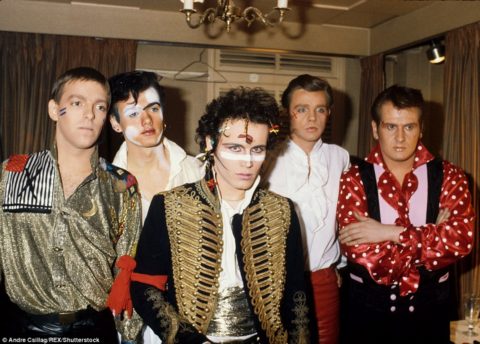
Chris Merrick Hughes (far left) with Adam And The Ants.
SDE: And also the narrative of ‘what’s going to be the first single?’.. possibly saving the really great one until single number two and all the rest of it…
CH: Oh absolutely. God bless him, Adam Ant… I can remember being up at CBS and this guy that was wheeled in to do a bit of A&R, and he was saying ‘Right well we’ll have this track, this is a sure fire – that’s a smash – and then we’ve got this one, then we can follow with that one, and we’ll put a couple of sacrificial ones in first and then we’ll have … definitely the big hit’. And I remember Adam Ant saying “Mate, if you’re telling me this is a smash, and you know what you’re talking about, release it now, let’s just have a fucking smash”. And it was quite funny how he was not interested in the kind of getting the ducks in a row and having three singles and a fucking terrible sort of ‘guesswork’ plan, he was saying if you’ve got the talent to spot a hit, let’s release it and have one [laughs]. But I thought this poor bloke kind of spun off like a broken toy, you know? It was great…
Thanks to Chris Merrick Hughes who was talking to Paul Sinclair for SDE.
The album Eirenic Life is released today – 14 July 2017. Signed copies can be ordered via the Helium Records website.
Compare prices and pre-order

Chris Merrick Hughes
Eirenic Life (LP+CD) [VINYL]

|
|
||||||||||||||||||||||||||||||||||||||||||||||||||||||
Side 1
1. Prelude / NSV
2. Tenemos Historia
3. Dily’s Dream
Side 2
1. The Girl with the Jesus Towel
2. Exmoor Pony Gavotte
3. Safe Warm Sun (Calm Ending)

 Interview
Interview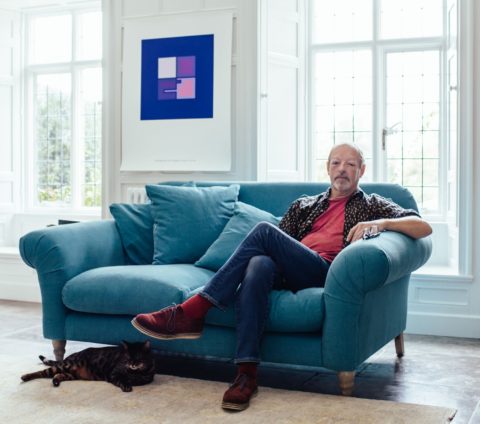
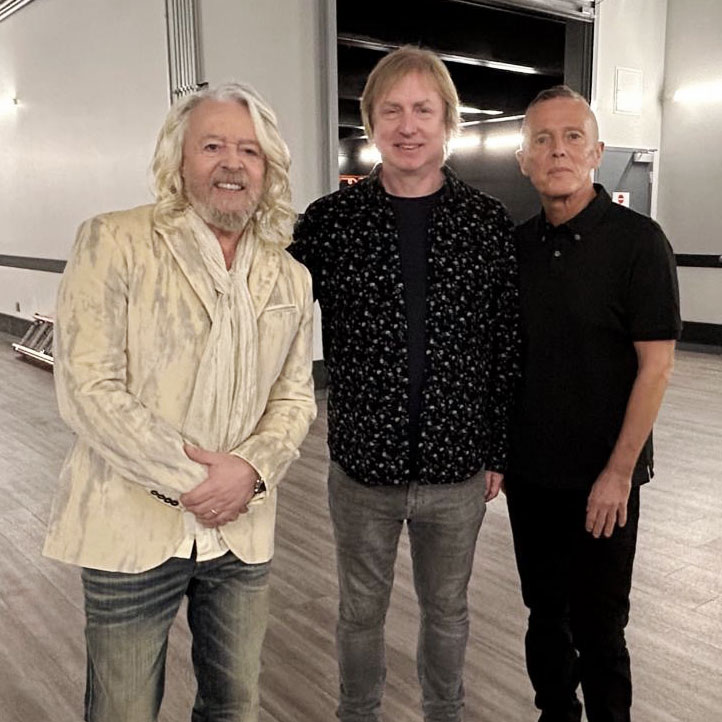
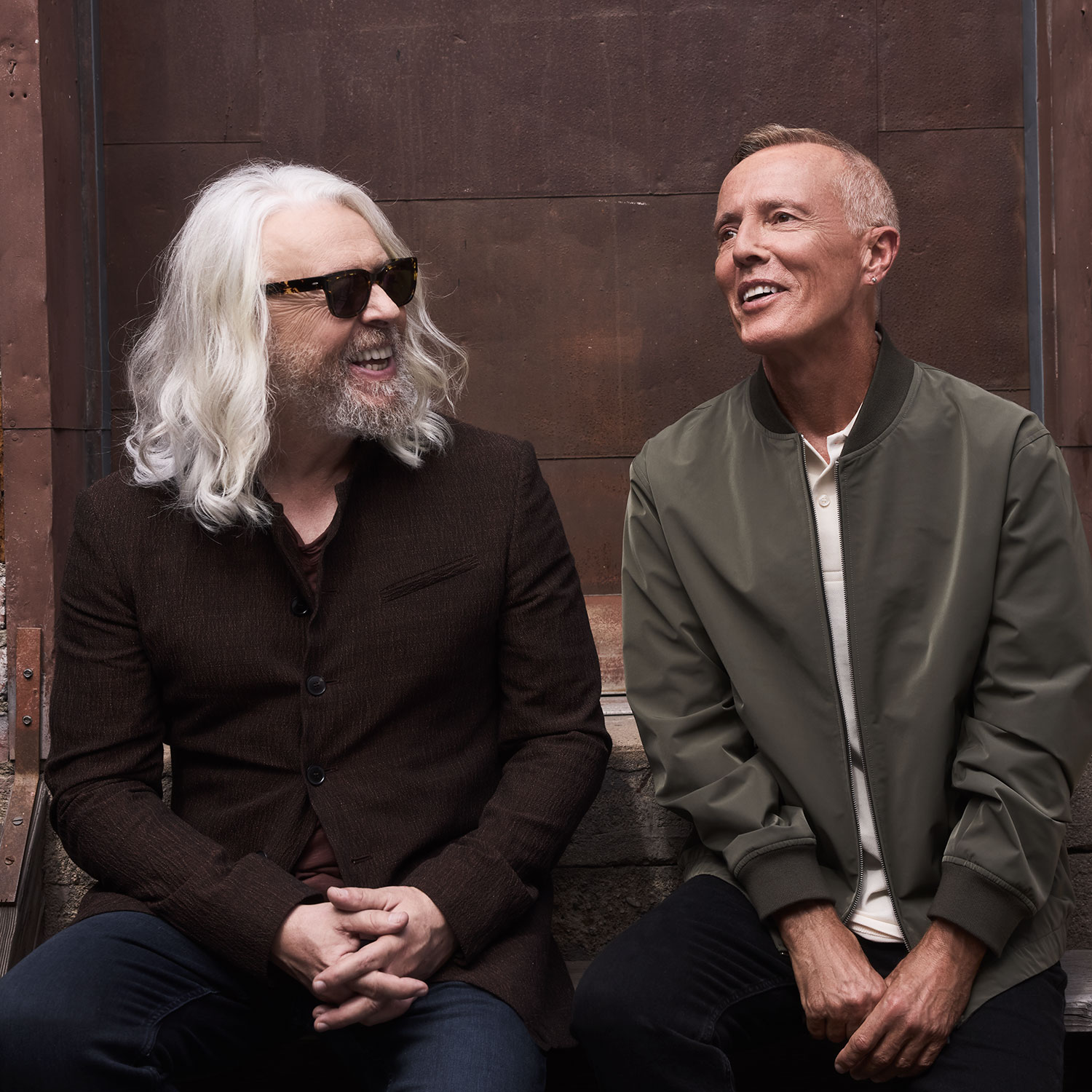
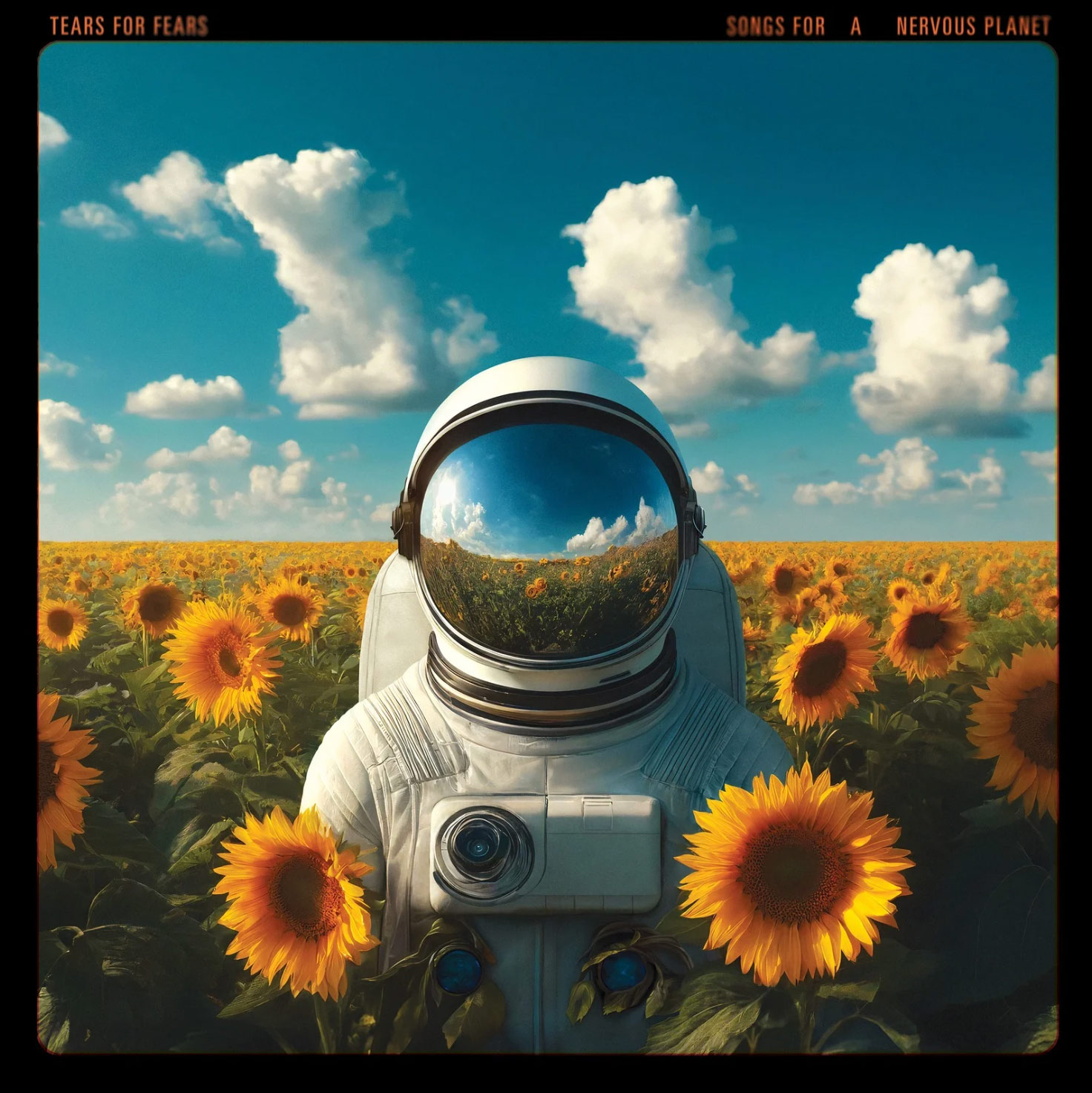

By Paul Sinclair
9